Advertisement
Appreciation
Robert Brustein, a giant of the American theater, dies at 96
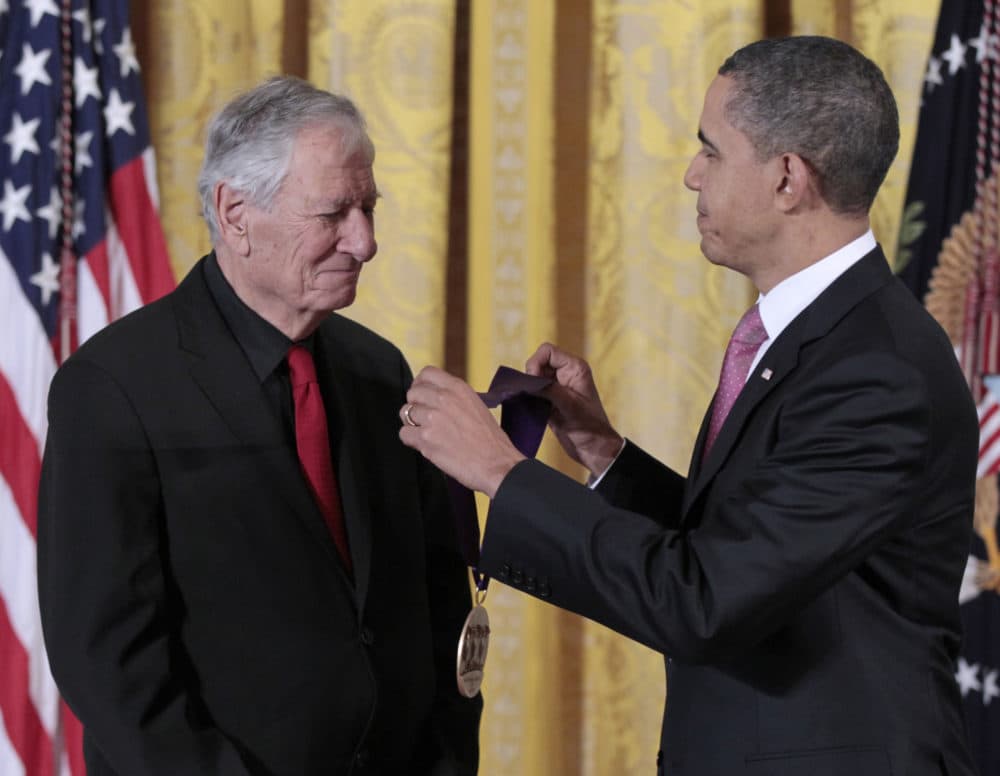
There was nothing shy about Robert Brustein, who died Sunday, Oct. 29, at the age of 96. The American Repertory Theater founder was fearless about taking on all comers be they Tom Stoppard, August Wilson or Tony Kushner. He would rail, in his erudite way, about the perceived sins of the A.R.T.’s main rival in the Boston area, the Huntington Theatre Company, or the place where I worked, the Boston Globe, and its often scabrous critic Kevin Kelly.
I was having a grand old time in the 1980s and ‘90s as television critic when Kelly died and my editor suggested that I make the switch to theater. The feuding protagonists Kelly and Brustein were the Holmes and Moriarty of Boston theater. Who was Holmes? It depends who was doing the casting. For some members of the local theater community, they were both Moriarty. To me, they were both heroes of a sort, complete with Achilles heels and glass chins.
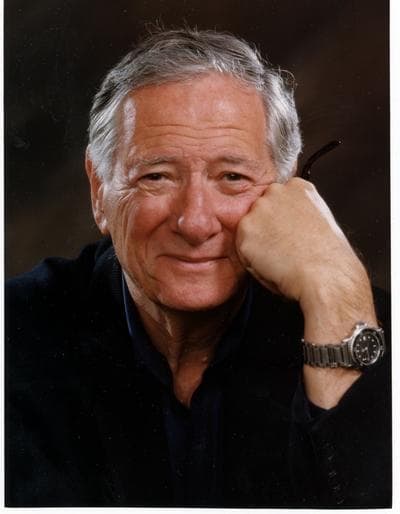
Brustein had been on the losing end of another feud, at Yale. He had founded the Yale Repertory Theatre in 1966 and ran it until 1979 when A. Bartlett Giamatti, Yale’s president, didn’t renew his contract. (It was the same year his first wife, Norma Brustein, an actor and teacher at Yale, died at 50 from a massive cardiac arrest.) Yale’s loss became Harvard’s gain as he came to Cambridge and founded the American Repertory Theatre in 1980. (Diane Paulus Americanized the spelling to “theater” when she became artistic director in 2008.)
Kelly had bristled when Brustein, who was also The New Republic’s theater critic, criticized the Huntington for allowing its theater to be used by August Wilson and his director, Lloyd Richards, to fine-tune New York-bound productions of his play. Brustein argued that it was not the role of regional theaters to stage what amounted to Broadway tryouts.
Kelly was likewise never accused of holding back and he let loose on Brustein. Not only, said Kelly, was it unseemly for Brustein to be taking on the Huntington, his main local rival, but he was taking on Lloyd Richards, who succeeded him at Yale. Furthermore, Kelly called Brustein a hypocrite because A.R.T. productions had also gone on to New York.
And that was just the beginning of Globe-New Republic back-and-forth nastiness. When Kelly died in 1994, Brustein called for the Globe to hire a distinguished theater scholar. Instead, they bumped up their television critic who was also not shy and had trashed the A.R.T.’s world premiere of David Mamet’s “The Cryptogram” while filling in for the ailing Kelly.
So welcome to your new job, Mr. Siegel.
Actually, Brustein and his No. 2 man Rob Orchard did graciously welcome me to the job. I had been a big theater fan ever since my English major days at Boston University in the 1960s when I became enamored of David Wheeler’s modernistic Theater Company of Boston.
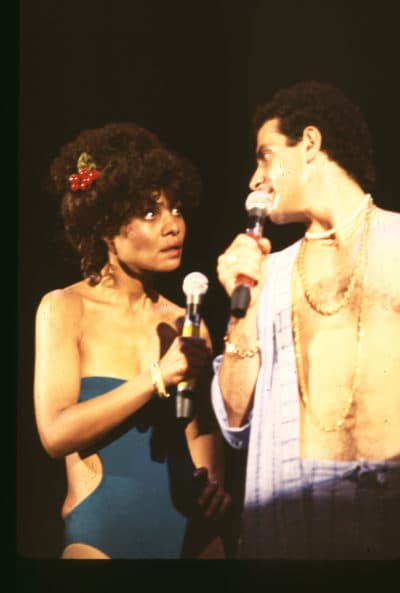
In many ways, Brustein was the natural successor to Wheeler, whose TCB ran its last season in 1973 and who later became one of the most dependable directors at A.R.T. Brustein also specialized in modernism. He regularly revisited plays by the fathers of modernism – and they all were fathers at the turn of the 20th century – Chekhov, Brecht, Ibsen, Strindberg, Shaw, Ionesco, Pirandello and Beckett. He also embraced the contemporary children of modernism. Harold Pinter’s works were a staple, along with those of Sam Shepard and Mamet, who became something of a resident playwright. The women were fewer in number but I saw my first productions by Suzan-Lori Parks, Anna Deavere Smith, Adrienne Kennedy and Naomi Wallace at the A.R.T.
But when it came to the productions, Wheeler’s M.O. was to get out of the playwright’s way, Brustein’s was more to get in the playwright’s (and the audience’s) face, at least in the manner of staging. He embraced the European mode of high modernism, a more avant-garde or high-concept approach of presenting theater even when, or particularly when, staging the classics. It would not be unusual then to see Agamemnon enter the Loeb Drama Center stage in a golf cart; Lulu, the eponymous bad girl of Frank Wedekind’s play, enter on roller skates; or for Samuel Beckett’s “Endgame” to be set in an abandoned subway station.
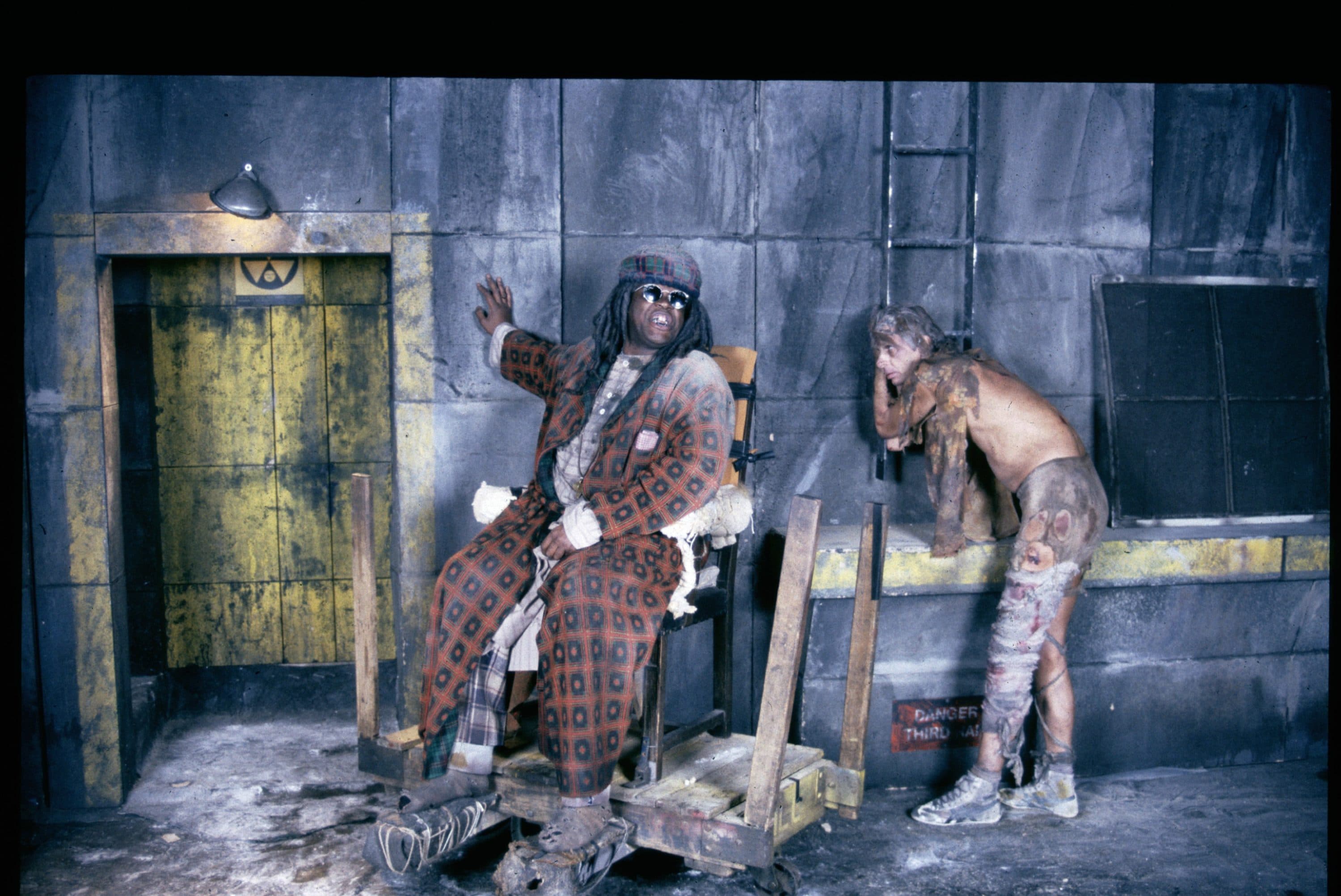
An infuriated Beckett tried to have his name removed from that 1984 production for disregarding his stage directions. Imagine how Shakespeare would have felt about a production of “Hamlet” beginning with company stalwart Jeremy Geidt declaring “I’m freezing my balls off.”
The playwright was not king at A.R.T. The company became known as the home of auteur directors such as JoAnne Akalaitis (who directed that controversial “Endgame”), Peter Sellars, Anne Bogart and Brustein’s successor, Robert Woodruff. They in turn featured creative artists who would assemble equally inspired designers whose sets, lighting, movement and other elements would add up to a kinetic orgy of effects that audiences embraced — or didn’t. The aesthetic was not for everyone and the results varied from production to production. When the A.R.T. came to Cambridge for its first season, there were 13,000 subscribers eagerly anticipating them. The number was roughly halved for the second season.
Rob Orchard, his No. 2 at both Yale and A.R.T. and who carried their legacy over to ArtsEmerson, which he founded, said via email, "His influence on the theater is incalculable. We worked together since 1969 and he was always the smartest person I knew and the most fun to be around. There isn't an aspect of my adult life that hasn't been blessed by our association. Among his many gifts his capacity for empathy was among the greatest."
Personally, I was always eager to walk into the Loeb Drama Center or their second stage at the Hasty Pudding Theatre and was frequently, hardly always, entranced when I walked out.
Looking back at it, Joni Mitchell had it right: You don’t know what you’ve got till it’s gone. A.R.T. stood for the American Repertory Theatre and Brustein totally believed in a fixed company — a true collection of top actors whom Boston-area theatergoers got to know in everything from Shakespeare to Shepard. Geidt, Cherry Jones, Karen MacDonald, Thomas Derrah, Stephanie Roth, Alvin Epstein, Will LeBow, Paula Plum, Tony Shalhoub, Remo Airaldi, John Douglas Thompson, Elizabeth Marvel and Bill Camp were only some of the names.
“He developed one of the best repertory companies in the country," said Thompson, "and the fact that I got to be a part of it was a special moment for me — that elite level of artistry that he dropped me in the middle of as if to say ‘You belong here, you belong in this group of artists.' And he let me develop as a leading man. Bob really started that for me, giving me opportunities that I was ready for and thirsty for.”
"Above all," said LeBow, "Bob had a fierce commitment to 'company.' He knew what keeping a company of actors could mean for the work. And he could see actors who were similarly committed — and wanted to work with them."
Actors who joined them for one show or one season included Mark Linn-Baker, Mark Rylance, Christopher Walken, Christopher Lloyd, Ken Howard, Kathy Bates, Diane Lane, Claire Bloom, F. Murray Abraham, Brooke Adams, Arliss Howard and Debra Winger. These actors came to Cambridge at a time when the Huntington eschewed big-name actors for the most part.
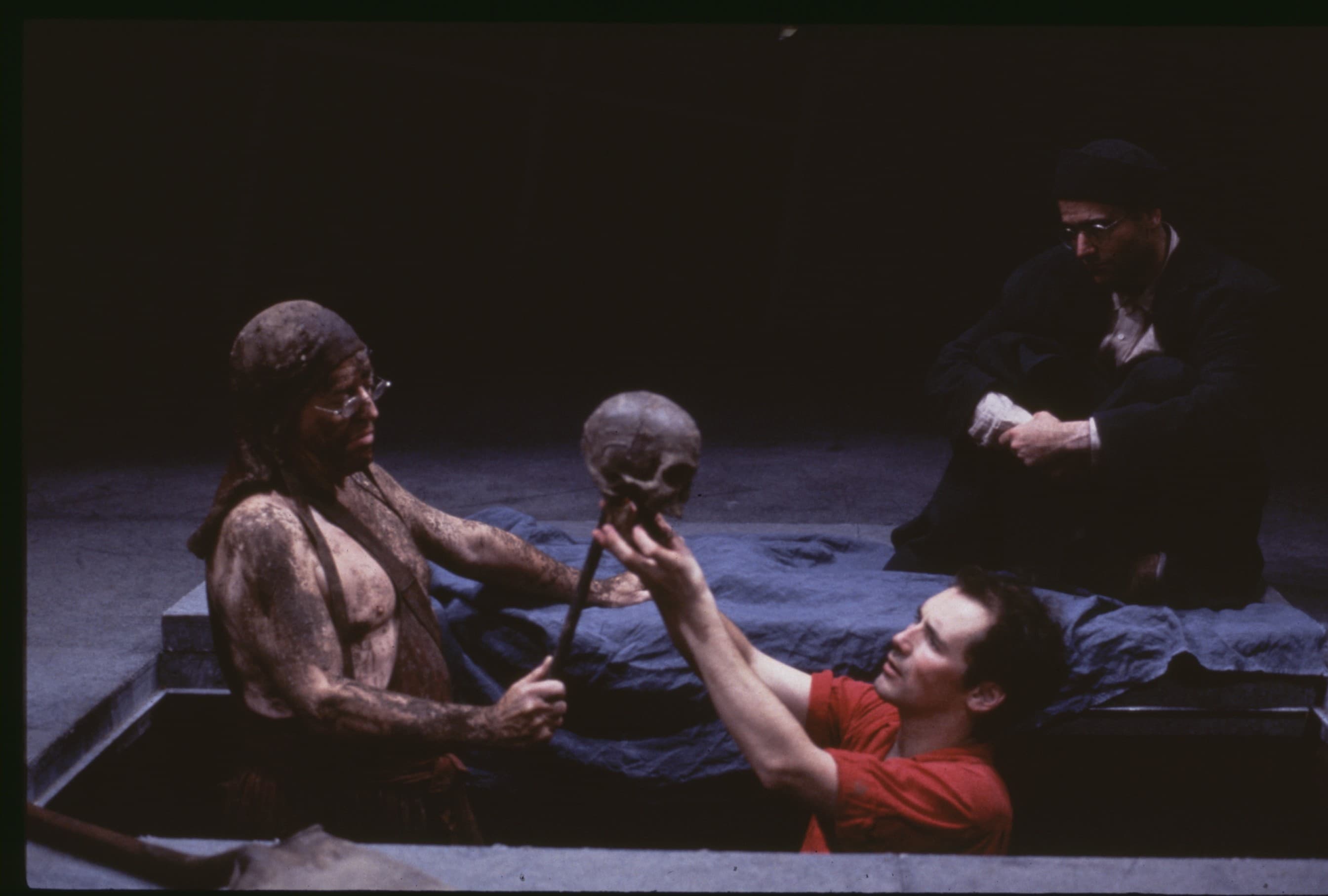
Contemporary writers, composers and directors championed by Brustein aside from Beckett, Mamet and Shepard? Along with those mentioned earlier, how about Philip Glass, Robert Wilson, Don DeLillo, Andrei Serban, Andrei Belgrader, Christopher Durang, Richard Foreman, Dario Fo, Larry Gelbart, Derek Walcott, Paula Vogel, Steve Martin, Julie Taymor, Susan Sontag, Lisa Kron, Martin McDonagh and Eric Bogosian, whose edgy monologues held Cambridge audiences spellbound long before TV swallowed him up.
A list of A.R.T. designers would similarly comprise a who’s who of many of the top people in the fields of lighting, costumes and sets.
Beyond the names, what was most important was an aesthetic that by and large avoided what was considered kitchen-sink realism in favor of a more abstract, dream-like theatricality that didn’t try to modernize classics as much as find a timeless world that looked forward and back simultaneously.
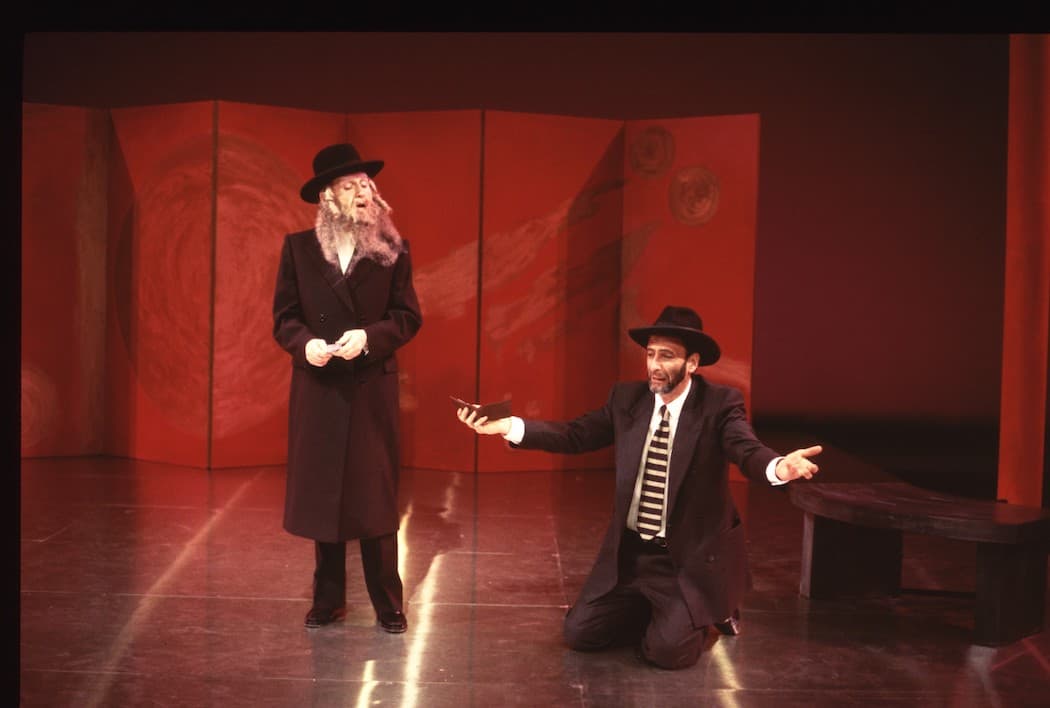
Brustein’s A.R.T. was equally notable for who was not on the list, artists who were personae non gratae at his theater, such as the two giants championed by Peter Altman (Brustein’s counterpart at the Huntington) — Tom Stoppard and the aforementioned August Wilson. Brustein didn’t care much — and said so — for them or others deemed to be among the best American playwrights of our time: Arthur Miller, Tony Kushner and Edward Albee. When Albee was a visiting artist at Emerson, I asked him if Brustein’s positive review of his play “The Goat, or Who Is Sylvia?” made him think better of Brustein. He shook his head dourly and said, “An enemy from the beginning.”
There was something of a yin yang, then, between the Huntington and A.R.T. during the Brustein-Altman years with the Huntington leaning toward more straightforward representational plays and the A.R.T. toward more psychological and symbolic productions. One could argue that Boston theatergoers were well-served since they had the best of both worlds.
On the other hand, one could argue that wearing two hats weakened Brustein as an artistic director. In some cases he would castigate artists in The New Republic and they’d never be seen again in Cambridge. It’s interesting that after Brustein critiqued a book by Shepard and Taymor’s “The Lion King,” neither artist returned to the A.R.T. Oskar Eustis, the Public Theater's artistic director who took himself out of the running as Brustein’s successor, championed the greats of all schools, both at Trinity Repertory Company and The Public Theater, where he wound up instead of A.R.T.
Eustis said of Brustein Sunday, "In America, the theater has always had a huge anti-intellectual streak, and the intelligentsia have often ignored the theater, viewing its show business roots with suspicion bordering on disdain. Bob created innumerable bridges that connected his two loves, the academy and the theater; he founded not one but two great theaters, Yale Repertory and the American Repertory Theater at Harvard. For many of us, he made the theater safe for smart people. He believed in a theater that had a place at the table, in debating the great issues of the mind and humanity, and he made theater that embodied that belief with excellence and enormous range.
"On a more personal note, when I arrived at Trinity Rep in 1994 he took me under his wing with a warmth and generosity that utterly astonished me. He supported me unconditionally, showered me with confidence, and helped me solve many of the thorny issues facing Trinity Rep. He also counseled me through the creation of the professional training program I created with Trinity and Brown, an extraordinary program that is still thriving today."
Brustein's warmth and generosity were matched by his second wife Doreen Beinart, whom he married in 1996. It was evident to all who visited him as his health was failing, including me and fellow critic Carolyn Clay, how much she doted on and cared for him.
Brustein was a terrific critic, one of the best in the country. His “The Theatre of Revolt” is the best book on modernism onstage that I know of. His New Republic reviews were must-reads whether I agreed with him or not. Like most critics, I was wowed by Stoppard’s 1993 play "Arcadia" but laughed out loud when Brustein called it “the best play of the century — the 19th century.”
Of the battles Brustein waged with playwrights, none was more front and center than the contentious debate between Brustein and August Wilson as it also involved racial issues in the theater.
Although liberal on most issues, Brustein bristled at anything approaching racial favoritism as you could discern from the paucity of people of color in his pantheon of playwrights and actors. Brustein insisted that his arms were open to greatness regardless of race — as witnessed by Smith, Kennedy and Derek Walcott and actors such as John Douglas Thompson.

Black artists today obviously embrace Wilson, but his theories of American theater were not the dictionary definition of wokeness either. Black people, he thought, should form their own theaters, not rely on white-run theaters to let them in. He also opposed color-blind casting, saying that Black people should play Black characters and not give the pretense that we are living in a color-blind society.
The two faced off in a 1997 debate at Town Hall in New York. As William Grimes said in his New York Times story:
“In his opening statement, Mr. Brustein … described his differences with Mr. Wilson, the acclaimed author of ‘Ma Rainey's Black Bottom,' 'The Piano Lesson' and other plays, as tension between two ideas of the theater as old as Plato and Aristotle. In the Platonic view, the theater is an arena for political action and the perfection of human behavior. To Aristotelians, it is a medium for exploring what he called ‘the workings of the human soul, which has no color.'”
Wilson stood firm that American Black artists should create Black theater centered on Black experience and that such art was no less universal than David Mamet’s.
When it came to Brustein vs. Wilson or the A.R.T. vs. the Huntington, I was pretty much Switzerland. I thought both August Wilson and Robert Wilson, the world’s most famous auteur director whose productions appeared at the A.R.T., were both pretty damn great. I’m sure Brustein would have preferred that I had a pro-A.R.T. agenda, but I think he was also happy that the A.R.T.-Globe feud was over.
For my part, I greatly admired Brustein and the only contentiousness I remember was when he allowed an A.R.T. staffer to pose as a member of the public to write a letter to the editor about my reviews of A.R.T. comedies like a Molière production I panned. In general, I did not think that A.R.T. comedies were nearly as funny or un-PC as Brustein thought they were. Brustein acknowledged that it was a mistake to let the staffer hide his affiliation and that was that.
At any rate, Brustein would carry on unbowed until he left at the end of the 2001-02 season, succeeded by Robert Woodruff, a brilliant director who, if anything, doubled down on Brustein’s aesthetic. But while critics, including me, heaped praise on his artistically aggressive choices, audiences were less impressed. He didn’t have Brustein’s charm (i.e. fundraising abilities) or his instincts for keeping Harvard’s nay-sayers at bay. Brustein had said, for example, that doing Shaw was his gift back to audiences who wanted more traditional theater. Eustis had laughed when I mentioned that to him saying, “Only in Cambridge would staging Shaw be a sign of artistic compromise.”
Still, the Shawlessness, humorlessness and growing number of empty seats at the A.R.T. after Brustein — Woodruff was part of a troika that included Rob Orchard and Gideon Lester — was too much for Harvard, who fired Woodruff and eventually turned to Diane Paulus, whose aesthetic is much more populist and political.
But the influence remained. In a statement Sunday, Paulus said, "Bob's impact on the American theater is immeasurable. As director, playwright, theater critic, artistic director, and founder of the American Repertory Theater, Bob galvanized groundbreaking theatrical creations and inspired artists from all over the world to do their best work. As a college student at Harvard, I was in awe of Bob when I interviewed him for my senior thesis on The Living Theatre. I was forever marked by the daring productions that were created at the A.R.T. under his leadership. Bob's influence on me personally, and on countless other artists, is enormous and profound."
Lester, now the acclaimed artistic director of the Fisher Center at Bard, added on Brustein's Facebook page, "From Bob I and so many others learned how to care for artists, how to support big ideas, how to open spaces for creativity and love at universities and beyond. He was my mentor and friend since I first met him in 1995."
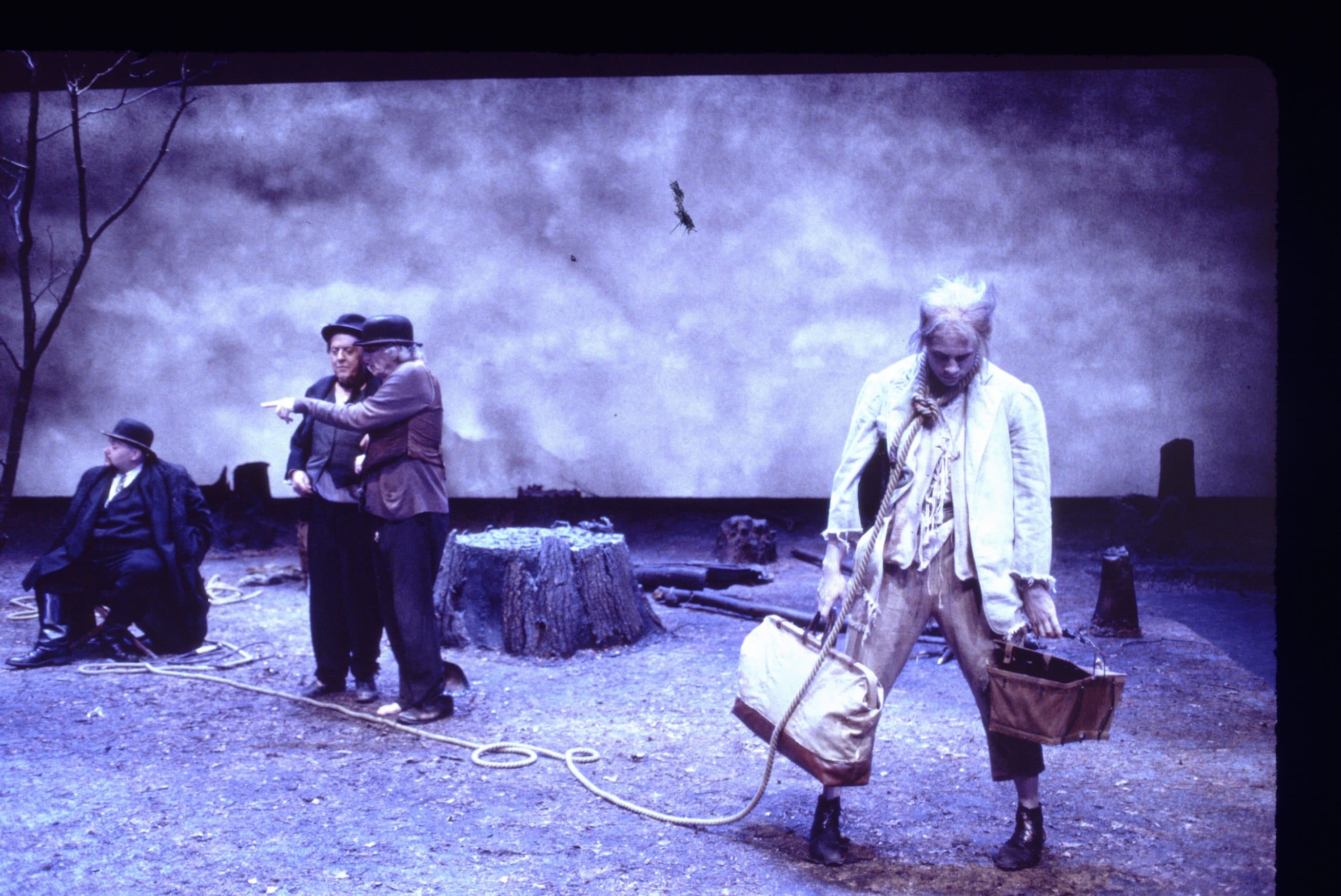
For his part, Brustein turned more toward playwriting, without great results, and academia, particularly at Suffolk University. While there, he was awarded the 2010 National Medal of Arts by President Barack Obama, one of his many awards as a theater artist and critic. In an East Room ceremony, Obama presented the medal to Brustein “for his contributions to the American theater as a critic, producer, playwright and educator. As founder of the Yale Repertory Theatre and the American Repertory Theatre and Institute and as the theatre critic for The New Republic since 1959, Mr. Brustein has been a leading force in the development of theater and theater artists in the United States.”
At the same time, The New Republic became less and less interested in theater criticism. He remained a regular at A.R.T. openings after he retired, although he was not happy when the regular company dwindled down to five or so actors under Woodruff and was further discouraged when Paulus disbanded the company altogether.
If you accept Brustein’s distinction between Platonic political theater and Aristotelian “workings of the soul” that also leaves his legacy in some question. Today the political is paramount, nowhere more so than at the A.R.T. Of the modernists Brustein treasured, you won’t find many being produced in the Boston area the past few seasons except for the Arlekin Players' adventurous adaptations of Chekhov.
Speaking of adventurous, Jeff Zinn, former artistic director of the Wellfleet Harbor Actors' Theater, said, "Robert Brustein changed the trajectory of my life and career. When I applied to the directing program at the ART Institute, I was living in New York City and spending my creative energies in a theatrical world dominated by realism. The artists I observed and worked with at the ART, guided by Brustein — Andrei Serban, Liviu Ciulei, Anne Bogart, Bill Irwin, Tina Landau — opened me to the possibilities of something more."
Would Brustein, had he remained active, have changed his mind about political theater as so many others did after the murder of George Floyd? I wouldn’t bet the house on it.
And then there’s the question of Brustein’s mode of presenting plays — abstract in form as well as content at a time when political demands and audience tastes seek the straightforward and no longer embrace abstraction, if they ever did.
Still, tastes change and it’s a fool’s errand to predict what theater will look like five to 10 years from now. I do hope there’s another Robert Brustein out there, complete with a penchant for the abstract and his epic, kinetic aesthetic. And also the determination to damn the torpedoes and go his or her own way.
Robert Brustein is survived by his wife Doreen Beinart; his son Daniel Brustein; a stepson, Peter Beinart, the journalist; a stepdaughter, Jean Stern; two grandsons; and five step-grandchildren.


